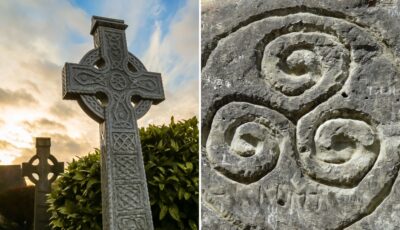

In Ireland, religion is no joke. It has had a profound impact on the country from the 5th century to the present day. Also, you’ll be hard-pressed to come across a non-believing Irish person, because in Ireland, over 95% of the Irish and Northern Irish population are Catholics, compared with only 4% Protestants… What you need to know about religion in Ireland…
It all began in the 5th century, when Ireland was evangelized by a man named Saint Patrick. The period of Christianization in Ireland lasted less than a century, and by the 6th century the whole of Ireland was officially converted to the religion.
From then on, Ireland saw the construction of countless monasteries, churches and abbeys, which were to become the epicenters of an unprecedented cultural and religious influence during the Middle Ages. Here, monks produced high-quality writings (such as the Book of Kells), learned Latin, and led a simple life in accordance with religious texts.
However, it was as a result of England’s repeated interference that Ireland saw the rise of a new religion in the 16th century, in clear opposition to the Catholic religion: Protestantism.
It was at this time that Henry VIII, King of England and Ireland, decided to break with the Roman Catholic Church and establish Protestantism as the state religion. He then decided to impose it not only on England, but also on Scotland and Ireland, which at the time were predominantly Catholic. The Irish then refused to convert, adding new tensions between the 2 countries…
These tensions lasted for many centuries, during which the British colonists implemented a policy of anti-Catholic discrimination, depriving Irish Catholics of their civil and social rights… Added to this were a number of particularly tense political disputes, as well as extremely violent clashes between the 2 camps.
But the phenomenon is still with us today, and more specifically in Northern Ireland, a territory under British interference, where many tensions still exist.
In cities like Belfast and Derry, Catholic and Protestant neighborhoods still clash over religion, but also over other issues, such as the problematic situation of Northern Ireland, now detached from the Republic of Ireland.
Religion is omnipresent in Irish life. The latter go to church regularly and share values that are sometimes considered conservative, particularly when it comes to family issues.
As for religion in general, the Irish are accustomed to attending Sunday mass every week in local churches or parishes. The latter are often very close to their priest, and take advantage of the opportunity to have their children baptized and receive Holy Communion… etc. The Irish even celebrate St. Patrick’s Day on March 17, their national holiday, to commemorate the evangelization of Ireland in the 5th century.
But Ireland is currently undergoing a real revival. Numerous scandals have marred the image of the Irish church, weakening the faith of the population (the fault of numerous sexual abuses and pedophilia perpetrated by Irish priests over the years, deliberately kept silent by the Church of Ireland).
This has enabled the country to make great inroads on much more progressive societal issues.
Starting with the issue of abortion and gay marriage (two controversial subjects that were recently legalized. As a reminder, homosexuality was long considered a crime until the 1980s).
Ireland is currently undergoing a real “crisis of faith”, but is managing to reinvent itself while remaining attached to its religious and moral values. It’s a delicate balance, but one that has seen the country enter a new era of modernity.